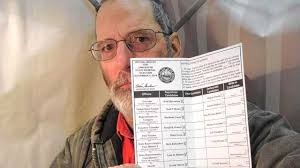| This is one of the few social waves Utah lawmakers caught early: Thanks to a unanimous vote in the 2015 Legislature, you may legally snap a selfie of yourself next to your ballot, even if you’ve already filled in the little bubbles and they are clearly visible for all to see. Chances are good you may not have known this was an issue. That apparently was Justin Timberlake’s |
| | excuse when he posted on Instagram a photo of himself at a voting machine in Tennessee. He just wanted to encourage young people to vote. Now he faces a possible fine and, less likely, jail time. He should move to Utah. Given the apparent ignorance of the masses about democracy’s fundamentals, it’s safe to say the concept of a secret ballot, or of the sanctity of a voting booth, may be another of those things the rising generation missed in high school civics class. Which is not to say we have a crisis on our hands. This is hardly another nail in the coffin of the republic, although political hardware stores seem to have these in plentiful supply right now. Let the whole world know for whom you voted? Well, why not? You let the world know everything else you do, no matter how trivial, through Facebook, Twitter, Instagram, Snapchat and several other sites I probably haven’t heard of. I’ve seen videos of your vacations, followed the ups and downs of your weight loss, saw a bit more of you around the pool than I wanted to last summer and, even if I only sort of know you as a friend of another distant friend, I know what your kids are dressing as for Halloween. Countless scolds, anxious to pass along baseless accusations and rumors that fact-checkers long ago debunked, have made their political preferences quite clear. Telling me how they voted is about as surprising as finding objectionable content on prime-time television. The only surprise may be to learn whom they picked for the school board. I haven’t seen a lot of useless memes regarding those races. On the opposite side of this issue is New Hampshire, where the Legislature actually voted in 2014 to make ballot selfies punishable by a fine of up to $1,000. The bill’s sponsor told the Boston Globe he worried about “situations where a voter could be coerced into posting proof that he or she voted a particular way.” Someone may be out there paying people for votes, which hasn’t been credibly alleged in New Hampshire since the 1890s. That’s about the year in which New Hampshire’s law sounds like it belongs. A federal appeals court struck it down a month ago. Quoting a 1957 Supreme Court decision on obscenity laws, Judge Sandra Lynch wrote that the law, “is like ‘burn[ing down] the house to roast the pig.’” Ironically, that could describe what the Internet, generally speaking, is doing to politics. The court’s decision applies only to a few states. In much of the land, ballot-booth selfies remain illegal. Utah is one of only five states that have taken steps in the opposite direction. As I said, this isn’t the end of democracy. That doesn’t mean it’s a great thing, however. Ten years have passed since Time magazine caused a stir by making all of us the “person of the year.” The stories explaining that decision seem quaint now. It was all about “the cosmic compendium of knowledge Wikipedia and the million-channel people’s network YouTube and the online metropolis MySpace” were making available. Reading it today, the story seems so naively upbeat, as if the wisdom of the masses was leading us to a better world. Instead, we have seen collective ignorance imbue falsehoods with credibility. As Nicholas Carr wrote recently for politico.com, social media has changed the emphasis from a candidate’s image to his or her personality. The personality that wins is the “one that’s big enough to grab the attention of the perpetually distracted but small enough to fit neatly into a thousand tiny media containers.” It’s not necessarily the one with the best ideas. Ballot selfies are a peripheral part of all this. To take one, you at least have to vote, and that’s a good thing. Just make sure you don’t photograph your neighbor’s ballot. |


 RSS Feed
RSS Feed

